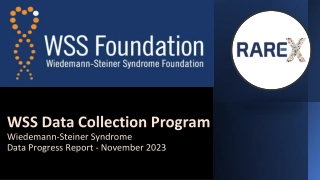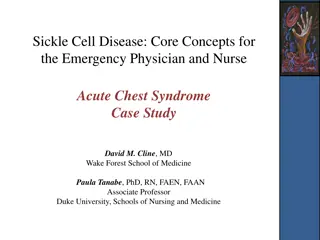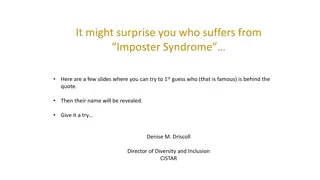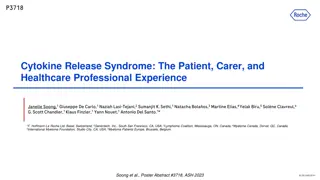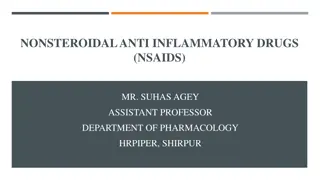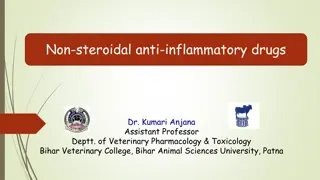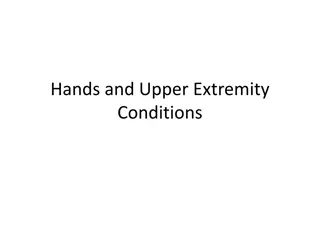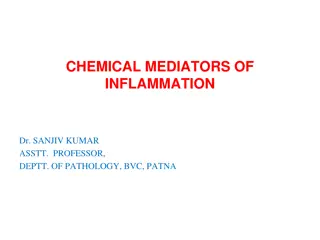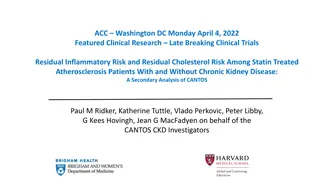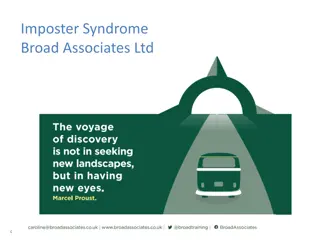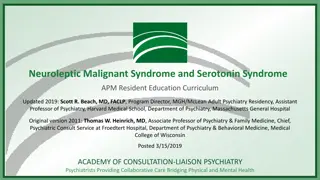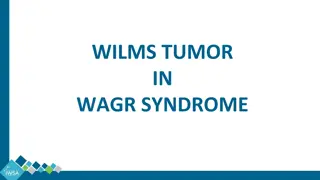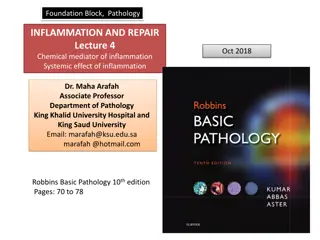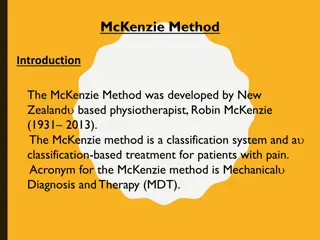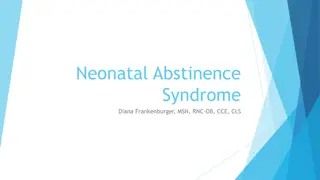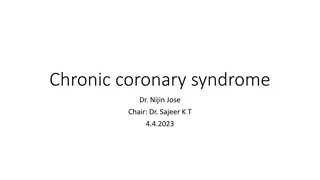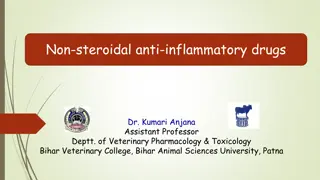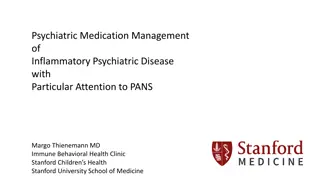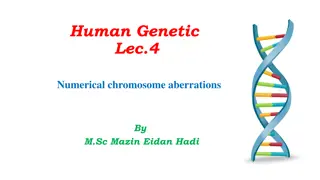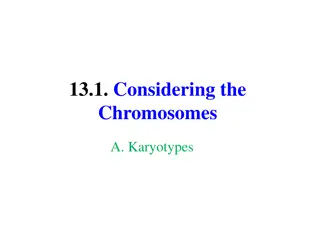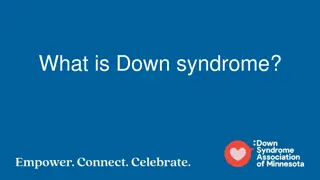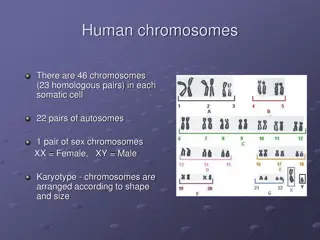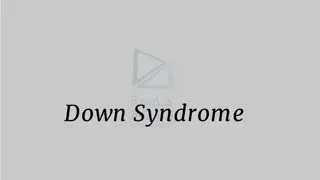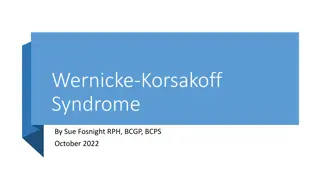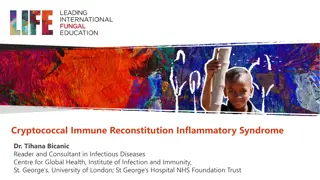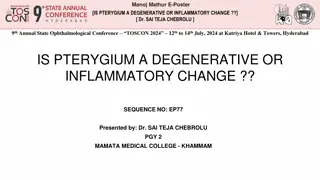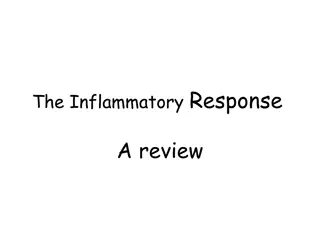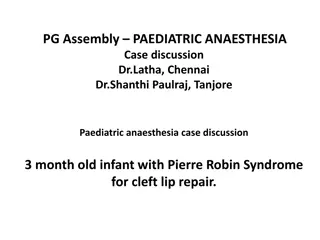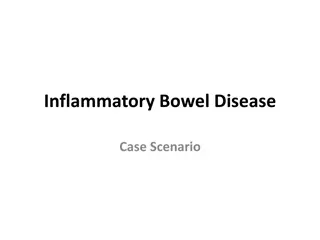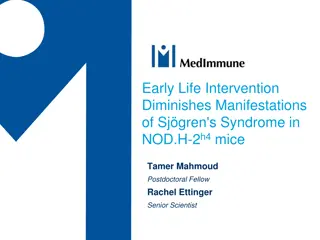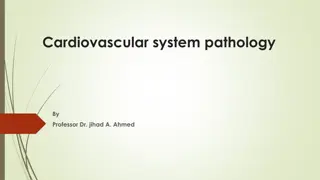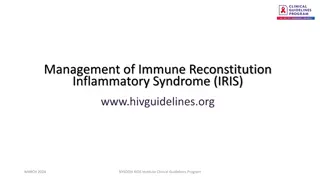Understanding Angelman Syndrome - Enhancing Lives Through Awareness
Angelman syndrome is a rare genetic condition impacting physical milestones and learning abilities. It affects around 1 in 15,000 individuals globally, with symptoms including speech difficulties, disrupted sleep, and seizures. Though there is no cure, increased awareness and research provide hope f
3 views • 20 slides
❤[PDF]⚡ Zee Zee Does It Anyway!: A Story about down Syndrome and Determination
\"COPY LINK HERE ; https:\/\/uyahsegoro.blogspot.com\/?book=B0BGNN7QZ6\n\n[READ DOWNLOAD] Zee Zee Does It Anyway!: A Story about down Syndrome and Determination | Zee Zee Does It Anyway is a Mom’ Choice Awards® Gold Recipient! PLUSReaders' Favorite gave this book a 5-star review!Have you e
1 views • 2 slides
Wiedemann-Steiner Syndrome Data Analysis and Progress Report - November 2023
This report provides insights into the enrollment, survey completion, KMT2A mutation types, reported issues, completion rates of relevant surveys, and symptoms in individuals diagnosed with Wiedemann-Steiner Syndrome. With a global perspective, the data highlights various domains of concern, offerin
1 views • 36 slides
Understanding Wolfram Syndrome: Symptoms and Implications
Wolfram Syndrome, also known as DIDMOAD, is a rare genetic disorder affecting about 1 in 160,000-770,000 people worldwide. It is characterized by the presence of Diabetes Insipidus, Diabetes Mellitus, Optic Atrophy, and Deafness. The primary genetic mutation in the WFS1 gene leads to various symptom
0 views • 22 slides
Managing Acute Chest Syndrome in Sickle Cell Disease
A case study of a 31-year-old male with sickle cell disease presenting in the emergency department with a pain crisis. The patient has a history of avascular necrosis, priapism, NSTEMI, cholecystectomy, and previous acute chest syndrome. Explore the patient's symptoms, past medical history, and reco
7 views • 19 slides
Famous Quotes on Imposter Syndrome - Can You Guess the Authors?
Discover famous quotes on imposter syndrome, try to guess the authors behind them, and learn how even well-known figures like Albert Einstein and Sonia Sotomayor have experienced feelings of inadequacy and self-doubt. Explore the prevalence of imposter syndrome and share your own experiences to crea
1 views • 7 slides
Understanding Cytokine Release Syndrome: Patient, Carer, and Healthcare Perspectives
Cytokine release syndrome (CRS) is a potentially life-threatening inflammatory response linked to T-cell therapies. Insights from patients, carers, and healthcare professionals reveal varied interests in digital solutions for CRS monitoring. Market research interviews and patient group reports highl
0 views • 11 slides
Understanding Nonsteroidal Anti-Inflammatory Drugs (NSAIDs) and Their Pharmacology
Nonsteroidal anti-inflammatory drugs (NSAIDs) are a class of analgesic, antipyretic, and anti-inflammatory medications that work by inhibiting prostaglandin synthesis. They provide relief from pain, reduce fever, and combat inflammation through various mechanisms. Aspirin, a commonly used NSAID, irr
0 views • 21 slides
Understanding Non-Steroidal Anti-Inflammatory Drugs (NSAIDs): Types and Classification
Non-Steroidal Anti-Inflammatory Drugs (NSAIDs) are a diverse group of medications with analgesic, anti-inflammatory, and antipyretic properties. They act primarily on peripheral pain mechanisms and vary in their selectivity of COX inhibition. This article explores the history, classification, and se
3 views • 16 slides
Overview of Hands and Upper Extremity Conditions
This informative content covers various hand and upper extremity conditions including nerve innervation, deformities, splints, and syndromes such as carpal tunnel syndrome and cubital tunnel syndrome. It discusses key nerves like the ulnar, median, and radial, their functions, associated deformities
1 views • 40 slides
Understanding Hypermobile Ehlers-Danlos, Mast Cell Activation, and Autonomic Dysfunction
Hereditary Connective Tissue Disorder, Hypermobile Ehlers-Danlos Syndrome (hEDS), and Mast Cell Activation Syndrome (MCAS) are three complex conditions with overlapping symptoms affecting collagen, joint laxity, and immune responses. Features associated with these conditions include joint pains, gas
2 views • 8 slides
Overview of Chemical Mediators of Inflammation and Their Roles
Chemical mediators of inflammation act on blood vessels and cells to contribute to an inflammatory response. These mediators include vasoactive amines like histamine and serotonin, plasma proteases such as the complement, kinin, and clotting systems, and important inflammatory mediators like C3a and
1 views • 24 slides
Residual Inflammatory and Cholesterol Risks in Atherosclerosis Patients
In a secondary analysis of the CANTOS study, researchers evaluated the impact of residual inflammatory risk and residual cholesterol risk in a large cohort of atherosclerosis patients already receiving lipid-lowering therapy. Results showed the relative contributions of inflammation and cholesterol
0 views • 11 slides
Managing Imposter Syndrome: Techniques and Impact
Explore the various aspects of Imposter Syndrome, including symptoms, impact, and management techniques. Understand how attributing successes, negative self-talk, and feelings of fraudulence can affect one's perception of ability and self-worth. Learn strategies such as identifying feelings, reframi
0 views • 13 slides
Neuroleptic Malignant Syndrome and Serotonin Syndrome Overview
This educational material provides an in-depth understanding of Neuroleptic Malignant Syndrome (NMS) and Serotonin Syndrome (SS) including their background, pathophysiology, clinical characteristics, differential diagnosis, risk factors, and treatment approaches. It also explores the historical back
3 views • 53 slides
Understanding Wilms Tumor in WAGR Syndrome
WAGR syndrome is a rare genetic condition associated with Wilms Tumor, aniridia, and developmental delays. Wilms Tumor is a form of kidney cancer mostly affecting children and is linked to genetic disorders like WAGR syndrome. The risk of Wilms Tumor is higher in children with WAGR syndrome, with po
1 views • 14 slides
Chemical Mediators of Inflammation: Understanding Sources and Effects
Chemical mediators of inflammation play a pivotal role in inducing specific events during acute inflammation. These mediators are produced in response to various triggers, including microbial products and host proteins, leading to a cascade of inflammatory responses. Understanding the sources and ef
1 views • 43 slides
Motor Abilities in Williams Syndrome and Their Importance
Motor abilities play a crucial role in the developmental journey of individuals with Williams Syndrome. From simple reflex movements to fine and gross motor skills, these abilities impact daily living, academic achievements, and overall cognitive and physical growth. Research on motor skills in both
0 views • 20 slides
Understanding Karyotypes and Chromosomal Abnormalities
Karyotypes are photographic inventories of an individual's chromosomes, helping determine genetic sex and detect abnormalities. Common chromosomal conditions like Down syndrome, Klinefelter's syndrome, and Turner's syndrome are discussed, along with the impact of abnormal sex chromosomes on characte
0 views • 10 slides
Understanding the McKenzie Method for Pain Management
The McKenzie Method, developed by physiotherapist Robin McKenzie, is a classification-based system for treating pain. It involves assessment, treatment, and prevention steps, with an emphasis on centralizing symptoms and promoting pain reduction. The method categorizes pain into three syndromes - Po
2 views • 23 slides
Overcoming Imposter Syndrome: How to Outwit Your Inner Voice
Discover how to outsmart your inner critic and tackle imposter syndrome effectively. Learn about the common features of imposter syndrome and ways to take action to be braver and build integrity. Challenge perfectionism, self-doubt, and limiting beliefs to shape your own success story.
0 views • 4 slides
Understanding Neonatal Abstinence Syndrome (NAS) and Opioid Crisis Impact
Neonatal Abstinence Syndrome (NAS) is a condition where infants experience withdrawal symptoms from exposure to drugs in utero, with a significant impact seen in regions like southeastern Kentucky due to the opioid crisis. This syndrome manifests through various short and long-term effects, necessit
0 views • 30 slides
Understanding Chronic Coronary Syndrome: Causes, Symptoms, and Management
Chronic coronary syndrome involves a dynamic process of atherosclerotic plaque accumulation and functional alterations in coronary circulation. It includes various clinical scenarios such as stable angina, asymptomatic ischemia, prior myocardial infarction, and more. The condition can be modified by
0 views • 131 slides
Overview of Non-Steroidal Anti-Inflammatory Drugs (NSAIDs) in Veterinary Pharmacology
Non-steroidal anti-inflammatory drugs (NSAIDs) are a diverse group of medications with analgesic, anti-inflammatory, and antipyretic effects. They act primarily on peripheral pain mechanisms and have limited CNS effects. NSAIDs have a long history dating back to the use of White Willow bark, and the
0 views • 16 slides
Management of Inflammatory Psychiatric Disease with Focus on PANS in Pediatric Patient
Dr. Margo Thienemann discusses the psychiatric medication management of a 10-year-old boy with inflammatory psychiatric disease, particularly focusing on Pediatric Acute-onset Neuropsychiatric Syndrome (PANS). The patient presented with various symptoms including compulsions, mood swings, OCD, oppos
0 views • 45 slides
Understanding Numerical Chromosome Aberrations in Humans
Numerical chromosome aberrations involve the gain or loss of whole chromosomes, impacting the genome size and potentially leading to genetic mutations. Nondisjunction, where chromosomes fail to separate properly during cell division, can result in aneuploidy - the presence of an extra or missing chr
0 views • 18 slides
Understanding Chromosomal Abnormalities and Syndromes
Human cells have 22 pairs of autosomes and one pair of sex chromosomes, totaling 46. Karyotypes help diagnose chromosomal abnormalities by aligning chromosomes in size order. Nondisjunction during meiosis can lead to abnormal chromosome numbers in gametes. Disorders like Down Syndrome, XYY Syndrome,
0 views • 30 slides
Understanding Down Syndrome: Causes, Effects, and Characteristics
Down syndrome, also known as Trisomy 21, is a genetic condition caused by the presence of an extra 21st chromosome. Discovered by Dr. John Langdon Down in 1866, this condition affects individuals in various ways, influencing their development and abilities. People with Down syndrome may learn skills
0 views • 10 slides
Understanding Chromosomal Disorders and Syndromes in Humans
Human chromosomes play a crucial role in determining genetic traits and health conditions. An extra copy of chromosome 21 leads to Down syndrome, while conditions like Klinefelter's syndrome, Turner's syndrome, Trisomy 13, 18, and 23 have distinct symptoms and implications. Trisomies result from abn
0 views • 20 slides
Understanding Down Syndrome: Types, Characteristics, and Impacts
Down syndrome is a genetic condition caused by an extra chromosome, typically chromosome 21. This leads to physical and cognitive challenges, with individuals exhibiting unique abilities. The syndrome presents with distinctive physical features, such as flattened face, almond-shaped eyes, and poor m
2 views • 14 slides
Understanding Wernicke-Korsakoff Syndrome: Overview and Clinical Considerations
Wernicke-Korsakoff Syndrome (WKS) comprises Wernicke's Encephalopathy (WE) and Korsakoff Syndrome. WE presents with altered mental status, ocular signs, and ataxia, while Korsakoff Syndrome manifests as amnesia and confabulations. Untreated WE can progress to Korsakoff Syndrome in about 80% of cases
0 views • 52 slides
Understanding Cryptococcal Immune Reconstitution Inflammatory Syndrome
Cryptococcal Immune Reconstitution Inflammatory Syndrome (C-IRIS) is a condition where rapid reversal of immunodeficiency triggers exaggerated inflammatory reactions in response to Cryptococcus antigens. It can manifest as either Unmasking IRIS or Paradoxical IRIS, with common CNS presentations incl
0 views • 10 slides
Understanding Pterygium: Degenerative or Inflammatory Change?
Pterygium, a common ocular surface lesion, has historically been considered degenerative due to factors like UV radiation exposure. However, recent research suggests an inflammatory component with cellular proliferative fibrosis and angiogenesis. This study presented at TOSCON 2024 delves into the h
0 views • 6 slides
Understanding the Inflammatory Response Mechanism
The inflammatory response is a crucial defense mechanism of the immune system. It comprises three lines of defense aimed at protecting the body from harmful pathogens. When a barrier is breached, such as by a splinter carrying bacteria, the inflammatory process is initiated. This includes the releas
0 views • 25 slides
Paediatric Anaesthesia Case Discussion: Challenges of Anaesthetizing an Infant with Pierre Robin Syndrome
Pierre Robin Syndrome (PRS) presents challenges in paediatric anaesthesia, especially in infants undergoing procedures like cleft lip repair. PRS is characterized by micrognathia, glossoptosis, and respiratory distress. Other syndromes associated with cleft lip include Treacher Collins syndrome, Gol
0 views • 56 slides
Inflammatory Bowel Disease Case Study: Diagnostic Challenges and Treatment Decision
A 56-year-old male with a history of inflammatory bowel disease presented with severe symptoms necessitating hospitalization. Despite steroid therapy, lack of improvement led to consideration of a total colectomy. Colonoscopy and biopsy results favored ulcerative colitis over Crohn's disease. This c
0 views • 31 slides
Understanding Imposter Syndrome: Causes, Effects, and Overcoming Strategies
Imposter Syndrome is characterized by feelings of inadequacy despite evidence of success, chronic self-doubt, and fear of being exposed as a fraud. It affects individuals' work performance, leads to avoidance of additional duties, assigns success to external factors, and can result in burnout. Howev
0 views • 10 slides
Early Life Intervention Diminishes Sjögren's Syndrome Manifestations in Mice
Early life intervention has been shown to reduce the clinical manifestations of Sjögren's syndrome in NOD.H-2h4 mice, which mimic key features of the human autoimmune disease. The syndrome is characterized by salivary gland autoantibodies, ectopic lymphoid follicles, reduced salivary and tear flow,
0 views • 19 slides
Understanding Inflammatory Disorders of the Cardiovascular System
Inflammatory conditions of the heart, such as pericarditis and myocarditis, can have various causes and manifestations. Pericarditis can present as fibrinous, purulent, or hemorrhagic, each with distinct characteristics and implications. Myocarditis, on the other hand, can result from infections lik
0 views • 9 slides
Management of Immune Reconstitution Inflammatory Syndrome (IRIS) Guidelines
This guideline provides recommendations for managing Immune Reconstitution Inflammatory Syndrome (IRIS) in patients undergoing Antiretroviral Therapy (ART). It covers terminology, treatment recommendations, initiating ART, key points, and emphasizes not interrupting ART except in life-threatening ca
0 views • 22 slides

![❤[PDF]⚡ Zee Zee Does It Anyway!: A Story about down Syndrome and Determination](/thumb/20462/pdf-zee-zee-does-it-anyway-a-story-about-down-syndrome-and-determination.jpg)
